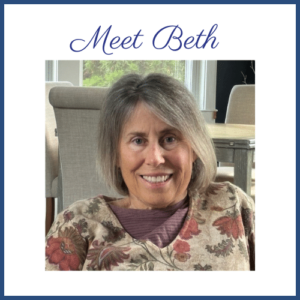Many women with lobular breast cancer have found LBCA after they were diagnosed. They want to help build a community among peers, to share the most current information about invasive lobular carcinoma (ILC) detection, treatment, and clinical trials, and to raise awareness about this common yet understudied breast cancer subtype that needs more research. Sharing their stories is one of those ways.
Meet Beth – a Conversation with LBCA Executive Director Laurie Hutcheson
I sat down with Beth in early November. We had discovered earlier in the year that we were neighbors and had since embarked on local ILC/LBCA advocacy together. I asked if I could interview her about her ILC story, and she was happy to share it.
Beth recently turned 63. She grew up on the south shore of Massachusetts and she and her husband raised their two children on the South Shore, except for 12 years when they lived in what she describes as “her nirvana” on a small island off Auckland, New Zealand.
In 2005, Beth was in her early 40s when she was first diagnosed with stage 2 pleomorphic ILC with lymph node involvement. She was working at the time as a salesperson in the oncology division of a pharmaceutical company. This meant that she knew something about breast cancer types. Beth describes herself as having been quite stoic at that time. She went through chemo and had no radiation. With irony she notes “I eventually received many of the oncology drugs that I had sold.” She said she knew of the drugs’ side effects and that she also knew too much about cancer to say she had “beaten it.”
In talking about her treatment journey, Beth laughingly shared the memory of how differently her children, a middle schooler, and a teen, reacted when she showed up bald headed and wigless at their schools to deliver lunch or a school project that they’d forgotten at home. She said that her daughter was mortified, urging her to remember to wear her hair, and her son told her she was beautiful – comments she has chalked up to their respective ages and grades.
Beth explained that because of her work in oncology drugs and given her particular diagnosis, she had enough information to anticipate that, at some point, her ILC would recur. She hoped not, but said she found it important to “just live her life and not obsess about it.” And then, 16 years later while living in New Zealand, and just a month before she turned 60, Beth learned that her ILC had spread to her bones. She said that like so many others who talk about the issues of ILC eluding detection, she had no real symptoms. Finding it was sort of a fluke, she said, when a pain in her rib that she had mostly ignored was investigated while she was being treated for an unrelated injury. In hindsight, she wishes that she had had surveillance checks every five years after completing her hormone therapy.
Facing the start of mILC treatment, her clinical team, whom she loves, allowed her to take some time and travel around New Zealand before starting the treatment. Beth said the trip was magical and advises anyone who is newly diagnosed with metastatic breast cancer to “take the time, if you can, and do something wildly distracting for yourself.”
During COVID, Beth found her way to me after reading a story about ILC and LBCA in our community magazine. She shared with surprise that until she met me, she had never met another person with ILC, and almost nobody with MBC. I described all LBCA does to support advocacy and promote research. She wanted to get involved. She already had a background of advocacy since her initial diagnosis and thought that nothing could be a better fit now than ILC research advocacy. She quickly joined the breast cancer advocacy research group at her medical center and became the patient advocate assisting LBCA’s recent ILC research grantee, Capucine Heraud, on submitting her grant application. “I want research advocacy to be my niche – and my legacy,” she explained, as she enthusiastically talked about donating tissue to help in the creation of a cell line. She also will work with Capucine over the course of her research grant. and notes how important it is for researchers to meet the people whose lives they are affecting.
Since returning to the US, Beth notes that she has had a pretty good two years, continuing to swim and bike, exercises she loves. Faced with another progression, ever optimistic and self-protective, Beth’s planning her next trip to New Zealand in January to visit her many friends.
Are you interested in telling others about your own lobular breast cancer story? Please email communications@lobularbreastcancer.org to request more information on how to submit your story. For more information about lobular breast cancer or to make a gift visit lobularbreastcancer.org.

